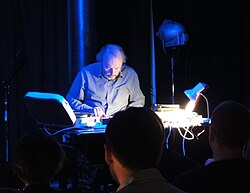I've been arguing with my old school pal Ian Grant about this. Apart from being just about the only football writer I care to read, Ig was my youthful companion in adoring the Swans. It is his positivity about the revival that forces me to acknowledge… well, not that I am wrong, but subjective. I do believe that appreciation of art depends a great deal on the personality of the critic. The mesh of me and Swans is no longer as tight as it was, and what I wanted from music is being provided by other media now.
I think that I have always demanded that art offers me alternatives – different visions of the world. This might excuse my faddish enthusiasm for African jit-jive in the late 1980s, or my chasing of intelligent electronica during the rave years. My dislike for The Streets is grounded in distaste for the ordinariness of his music and words.
Swans were alternative, and were probably my first taste of the uncanny. Being an X-Men fan means I knew what the word meant before I knew what it implied. The uncanny is sublime, terrifying, out of place, other, surreal, intense, an awareness of my place in the universe, and the immensity of that universe.
By 1993, the uncanny was playing out in the beats of drum’n’bass, in the glacial soundscapes of The Aphex Twin, and echoing in the Kronos Quartet’s re-appropriations of the string quartet. I didn't need Swans to provide it.
Other bands seemed to be following Gira’s lead – Godspeed You Black Emperor did the majestic orchestration thing, Mogwai’s early albums made challenges on rock’s predictable use of the guitar.
When Gira reformed Swans, I wasn't that interested. Even now, that first ‘come back’ album has little to hold me. It sounds loose, unstructured and more of a rebranding of Angels of Light. This would change when I saw Gira do his solo set, and I heard The Seer.
The Seer was extravagant and exciting – and went beyond what Swans had been. Like Love of Life given a contemporary production, it seemed to laugh at the bands that had been influenced by Swans and add in a relentless sophistication, of muscular beats and sinewy melodies. I was back in.


.jpg)








